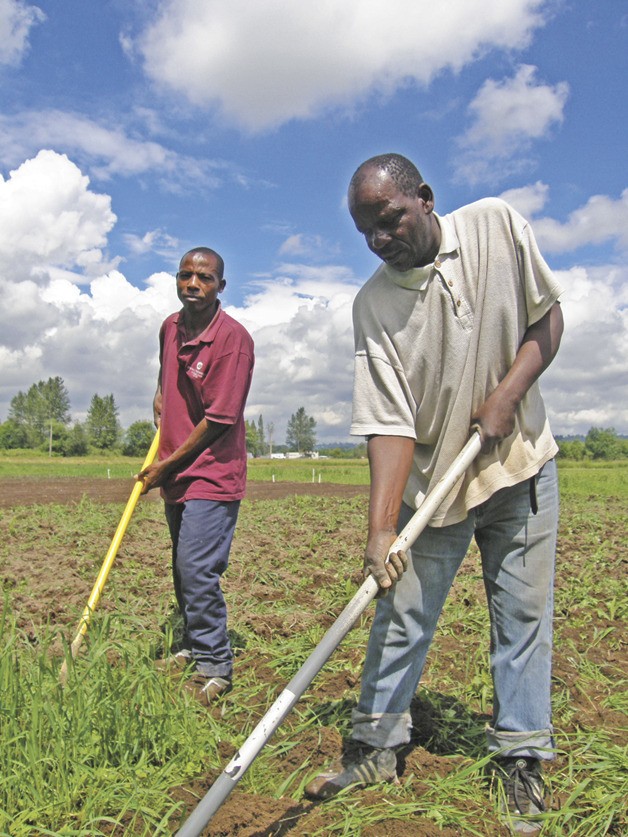Mohamed Rago stared at the fertile fields with their rich soil and latent promise to feed his wife and five children and wished he were out there.
But Rago and other Somali Bantu and Burundian refugees who turn the soil thanks to Burst for Prosperity, a local poverty reduction initiative, could only stand around and look.
Their hands were idle not by their choice but because of thieves who recently broke into their tool shed in Auburn and stole $5,000 worth of farming equipment, including two rototillers, numerous hoes, shovels and boots, even the field’s aluminum gate.
Speaking through an interpreter, Rago explained how deeply the theft cut.
“We all felt very bad about the theft, and we still feel depressed because we cannot do anything for days,” Rago said. “We don’t have tools, we have nothing. It’s not only that our things are stolen, but our spirit is kind of hurt also.”
Rago, a Somali Bantu, is among a group of refugees who immigrated to the United States from East Africa two years ago. The Burundi came from refugee camps in Tanzania where their families had been for 37 years. The Somali Bantu fled bloody civil war.
All of them came without marketable skills, most spoke no English, all faced challenges that threatened to bury them under a mountain of perpetual poverty.
The farming project is in partnership with the Somali Bantu Farmers Association of Washington, Highline Community College, Washington State University, and the Hope Burundian Cooperative.
Burst for Prosperity tries to reduce poverty in Washington State by researching and testing innovative models suggested by the community that change systems to help people achieve financial independence. It is an initiative of Children’s Home Society of Washington, the state’s oldest and largest non-profit organization devoted to serving children and families.
Burst for Prosperity met with the immigrants. As it turned out, all of them had been farmers, so agriculture would be their royal road out of poverty, their means of getting off welfare and standing on their own. And as they learned to read and write English and picked up what they would need to make it in this country, farming would help them earn a little money on the side.
“The Somali Bantu have a history of farming in Somalia, traditionally that’s how they earn their living,” said Njambi Gishuru, the project lead for Burst for Prosperity. “The Burundi community was in refugee camps in Tanzania for almost 40 years, so they didn’t have any skills. They had no opportunities to own a land or farm. Their experience came from being hired by Tanzanian citizens who let them work the land for them in exchange for food. We identified their needs so we could hook them up with resources and training to learn how to grow crops in this climate and how to operate greenhouses.”
Burst for Prosperity leased the field, allotting five acres to the Bantus and five acres to the Somalis and finding them equipment to work the land. Burst partnered with Washington State University and King County Agriculture to support this community with the resources to help them learn how farming is done in America.
But thanks to thieves, this promising initiative has ground to a halt.
“Without these tools they are standing around because they have nothing to work with,” Gishuru said. “At the moment, some of them are pulling weeds, trying to cultivate some crops, because the selling season has started. But they are paralyzed because they don’t have any tools. People are beginning to donate to help them. We also have volunteers, including a teacher from Highline Community College and his students. People have donated some tools, but we need more than that – we need major tools.”
“Being here without working is really a challenge to you with your family,” said Burundi native Serges Hakizamana, a community facilitator working for Burst for Prosperity. “In our country, they have many kids like 10, or 12 in the case of one guy, and it’s really hard to feed all of them without working.”
====
You can help
What was stolen and how to help:
• One water pump
• Two rototillers
• A tape measure
• 12 hoes
• 11 boots
• One aluminum gate
• One box of unopened corn seeds.
• Four shovels
For those who would like to help the hard-hit farmers, please contact Burst For Prosperity at www.burstforprosperity.org or call (206) 527-3888



